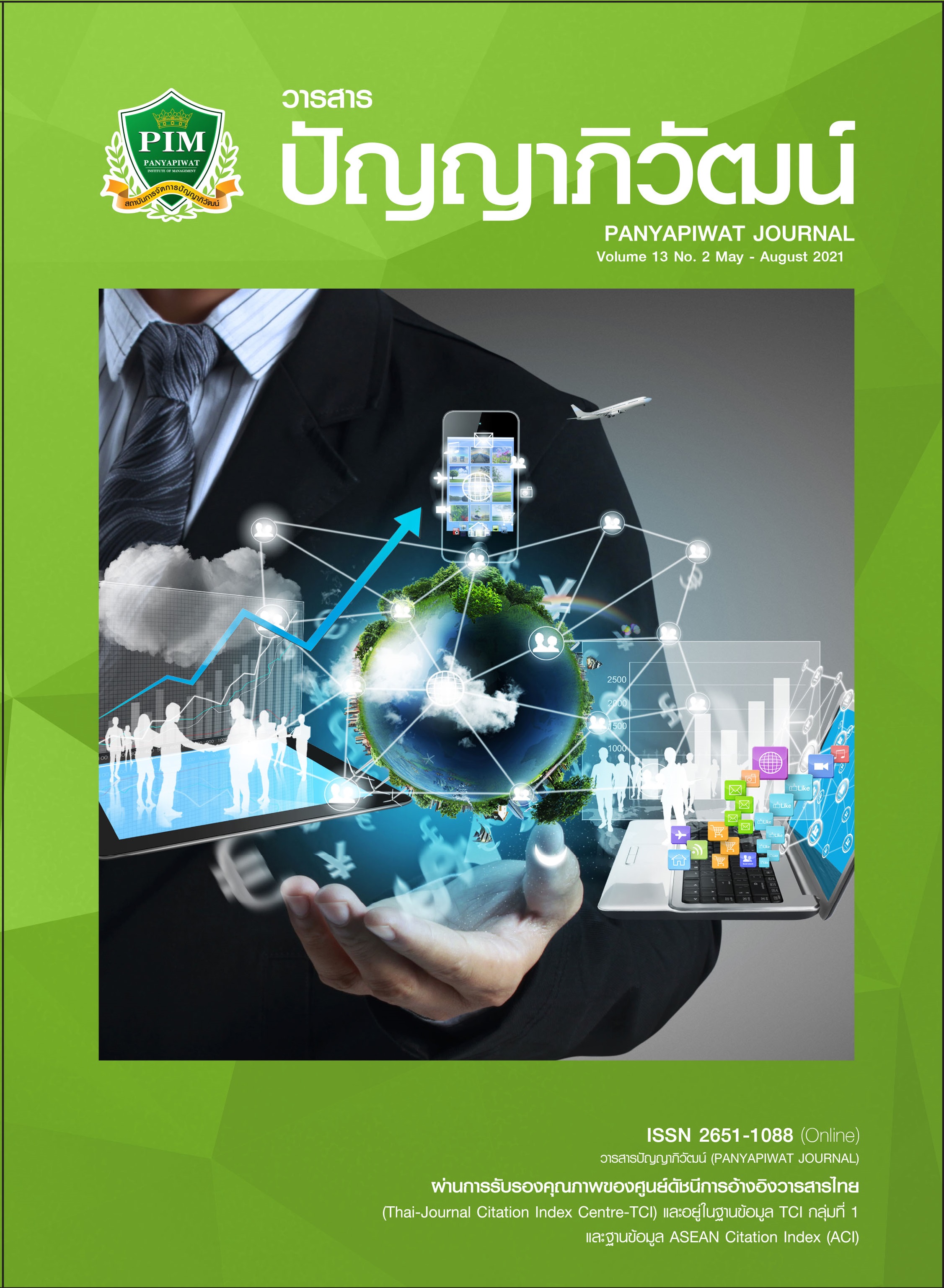อิทธิพลของเทคโนโลยีการเงินและการจัดการความรู้ ที่มีต่อผลการดำเนินงานของธนาคารพาณิชย์ไทย
Main Article Content
บทคัดย่อ
การวิจัยครั้งนี้มีวัตถุประสงค์เพื่อ 1) ศึกษาอิทธิพลของเทคโนโลยีการเงินและการจัดการความรู้ที่มีต่อผล การดำเนินงานของธนาคารพาณิชย์ 2) ศึกษาอิทธิพลของเทคโนโลยีการเงินที่มีต่อการจัดการความรู้ของธนาคาร พาณิชย์ไทย และ 3) ตรวจสอบความสอดคล้องของอิทธิพลของเทคโนโลยีการเงินและการจัดการความรู้ที่มีต่อ ผลการดำเนินงานของธนาคารพาณิชย์ ประชากร คือ ผู้บริหารและพนักงานของธนาคารพานิชย์ทั่วประเทศ การกำหนดกลุ่มตัวอย่างใช้กฎแห่งความชัดเจน (Rule of Thumb) ได้ขนาดกลุ่มตัวอย่าง 1,110 ตัวอย่าง ใช้เทคนิคการสุ่มตัวอย่างแบบหลายขั้นตอน เครื่องมือที่ใช้ในการวิจัยเป็นแบบสอบถาม สถิติที่ใช้ในทดสอบ ความตรงเชิงโครงสร้างของแบบสอบถาม ประกอบด้วย การวิเคราะห์องค์ประกอบ ค่าความเชื่อมั่น ความน่าเชื่อถือ เชิงโครงสร้าง ค่าเฉลี่ยของความแปรปรวน และใช้การวิเคราะห์ความสัมพันธ์เชิงโครงสร้างเพื่อทดสอบสมมติฐาน
ผลการวิจัยพบว่า 1) ปัจจัยด้านการใช้เทคโนโลยีการเงินในธุรกิจหลักของธนาคาร ปัจจัยด้านการใช้ เทคโนโลยีการเงินเพื่อสนับสนุนการทำงานของธนาคาร ปัจจัยด้านการใช้เทคโนโลยีการเงินในธุรกิจบริการทาง การเงิน ปัจจัยด้านการจัดการความรู้ ร่วมกันพยากรณ์ให้เกิดอิทธิพลต่อผลการดำเนินงานของธนาคารได้ ร้อยละ 31.5 2) ปัจจัยด้านการใช้เทคโนโลยีการเงินในธุรกิจหลักของธนาคาร ปัจจัยด้านการใช้เทคโนโลยี การเงินเพื่อสนับสนุนการทำงานของธนาคาร ปัจจัยด้านการใช้เทคโนโลยีการเงินในธุรกิจบริการทางการเงิน ร่วมกันพยากรณ์ให้เกิดอิทธิพลต่อการจัดการความรู้ได้ร้อยละ 64.0 และ 3) ผลการตรวจสอบความสอดคล้อง ของรูปแบบความสัมพันธ์เชิงสาเหตุพบว่า รูปแบบมีความสอดคล้องกลมกลืนกับข้อมูลเชิงประจักษ์โดยมีค่า χ2/df = 1.069, P-value = .113, GFI = .968, AGFI = .948, CFI = .998, RMSEA = .009, RMR = .021
Article Details
“ข้าพเจ้าและผู้เขียนร่วม (ถ้ามี) ขอรับรองว่า บทความที่เสนอมานี้ยังไม่เคยได้รับการตีพิมพ์และไม่ได้อยู่ระหว่างกระบวนการพิจารณาลงตีพิมพ์ในวารสารหรือแหล่งเผยแพร่อื่นใด ข้าพเจ้าและผู้เขียนร่วมยอมรับหลักเกณฑ์การพิจารณาต้นฉบับ ทั้งยินยอมให้กองบรรณาธิการมีสิทธิ์พิจารณาและตรวจแก้ต้นฉบับได้ตามที่เห็นสมควร พร้อมนี้ขอมอบลิขสิทธิ์บทความที่ได้รับการตีพิมพ์ให้แก่สถาบันการจัดการปัญญาภิวัฒน์หากมีการฟ้องร้องเรื่องการละเมิดลิขสิทธิ์เกี่ยวกับภาพ กราฟ ข้อความส่วนใดส่วนหนึ่งและ/หรือข้อคิดเห็นที่ปรากฏในบทความข้าพเจ้าและผู้เขียนร่วมยินยอมรับผิดชอบแต่เพียงฝ่ายเดียว”
เอกสารอ้างอิง
Abdusalam A., Abuazoum, A., Azizan, N., & Ahmad, N. (2013). Knowledge Sharing for the Islamic Banking Sector in Malaysia. International Journal of Computer and Communication Engineering, 2(3), 368-371.
Acharya, R., Kagan. A., & Lingam, S. (2008). Online Banking Applications and Community Bank Performance. The International Journal of Bank Marketing, 26(6), 418-439.
Afthanorhan, W. M. A. W. & Ahmad, S. (2013). Modelling the Multigroup Moderator-Mediator on Motivation among Youth in Higher Education Institution to Wards Volunteerism Program. International Journal of Scientific & Engineering Research, 4(7), 91-95.
AL-Hawari, M. & Ward, T. (2006). The Effect of Automated Service Quality on Australian Banks’ Financial Performance and the Mediating Role of Customer Satisfaction. Marketing Intelligence & Planning, 24(2), 127-147.
Alrawi, K. & Elkhatib, S. (2009). Knowledge Management Practices in the Banking Industry: Present and Future State-Case Study. Journal of Knowledge Management Practice, 10(4), 68-84.
Apirungruengsakul, N. & Pasunon, P. (2020). Marketing Innovation Driven to E-Commerce. Panyapiwat Journal, 12(1), 1-14. [in Thai]
Arnaboldi, F. & Ossignoli, B. (2010). Financial Innovation in Banking. Retrieved March 9, 2018, from https://convegni.unicatt.it/meetings_Arnaboldi_Rossignoli.pdf
Baker, P. F. (2004). Are Inefficient Entrepreneurs Driven Out of the Market? Journal of Economic Theory, 114(1), 329-344.
Bronwyn, H. H. & Francis, K. (1998). Effects of Technology and Innovation of Firm Performance, Employment and Wages. Economics of Innovation and New Technology, 6(1), 3-17.
Chiradejnant, B. N. & Tunpow K. (2019). The Efficient of Life Insurance Management Model in the Digital Economy Thailand 4.0. Panyapiwat Journal, 11(1), 1-11. [in Thai]
Dinardo, F. (2015). The Rise of Alternative Finance: How FinTech Companies are Revolutionizing the Financial Services and the Traditional Bank Financing. Department of Economic and Business Sciences, University of Delgi Studi Di Padova.
Fornell, C. & Larcker, D. F. (1981). Evaluating Structural Equation Models with Unobservable Variables and Measurement Error. Journal of Marketing Research, 18(1), 39-50.
Ghanty, J. & Gibson, L. (2016). The Impact of FinTech on Financial Service Businesses. London: K & L Gates LLP.
Hair, J. F., Black, W. C., Babin, B. J., & Anderson, R. E. (2010). Multivariate Data Analysis (7th ed.). New York: Pearson Prentice-Hall.
Ida, Y. (2008). Knowledge Management in Asia Experience and Lessons. Tokyo: Asian Productivity Organization.
International Organization of Securities Commissions. (2017). IOSCO Research Report on Financial Technology (Fintech). Retrieved March 9, 2018, from https://www.iosco.org/library/pubdocs/pdf/IOSCOPD554.pdf
Kaplan, R. S. & Norton, D. P. (1992). The Balanced Scorecard-Measures that Drive Performance.Boston: Harvard Business Review.
Kline, R. B. (2011). Principles and Practice of Structural Equation Modeling (3rd ed.). New York: Guilford Press.
Kreća, M. & Barać, D. (2015). Comparative Analysis of Core Banking Solutions in Serbia Management. Journal of Sustainable Business and Management Solutions in Emerging Economies, 20(76), 11-22.
Kruasom, T. & Saenchaiyathon, K. (2015). Achievement a Sustainable Competitive Advantage on the Integration of Resource-Based View and Dynamic Capacity. International Business Management, 9(1), 79-85.
Kuo, T. H. (2011). How to Improve Organizational Performance through Learning and Knowledge. International Journal of Manpower, 32(5/6), 581-603.
Nunnally, J. C. (1978). Psychometric Theory. New York: McGraw-Hill.
Pousttchi K., Moormann, J., & Felten, J. (2015). The Impact of New Media on Bank Processes: a Delphi Study. International Journal Electronic Business, 12(1), 1-45.
Rashed, M. S. (2016). The Readiness of Banks in Knowledge Management: A Study of Three Private Commercial Banks in Bangladesh. Journal of Business and Financial Affairs, 5(1), 181.
Rovinelli, R. J. & Hambleton, R. K. (1977). On the Use of Content Specialists in the Assessment of Criterion-Referenced Test Item Validity. Journal of Educational Research, 2(2), 49-60.
Ruamruk, W. (2016). Role of Fintech toward Finance Institute in Era of Digital. Research Report of Government Saving Bank. Retrieved February 13, 2019, from https://www.gsb.or.th/getattachment/eaab8bae-4abb-400f-9f8b-e683fd69de0e/3IN_hotissue_fintech_detail.aspx [in Thai]
Saetim, S. (2017). Payment Gateway: The Heart of Electronic Commerce’s Payment System. Panyapiwat Journal, 9(2), 254-266. [in Thai]
Salampasis, D. & Mention A. L. (2018). FinTech Harness Innovation for Financial Inclusion. Handbook of Block Chain Digital Finance and Inclusion. International Journal of Transitions and Innovation Systems, 6(1), 62-87.
Sandhawalia, B. S. & Dalcher, D. (2011). Developing Knowledge Management Capabilities: A Structured Approach. Journal of Knowledge Management, 15(2), 313-328.
Schumacker, R. E. & Lomax, R. G. (2010). A Beginner’s Guide to Structural Equation Modeling. New Jersey: Lawrence Erlbaum Associates.
Teerathanachaiyakun, K. (2014). Knowledge Management Success Factors. Panyapiwat Journal,
(Special), 134-144. [in Thai]
Wu, H. (2012). Constructing a Strategy Map for Banking Institutions with Key Performance Indicators of the Balanced Scorecard. Evaluation and Program Planning, 35(3), 303-320.
Zachariadis, M. & Ozcan, P. (2017), The API Economy and Digital Transformation in Financial Services: The Case of Open Banking. Retrieved February 14, 2019, from https://ssrn.com/abstract=2975199


